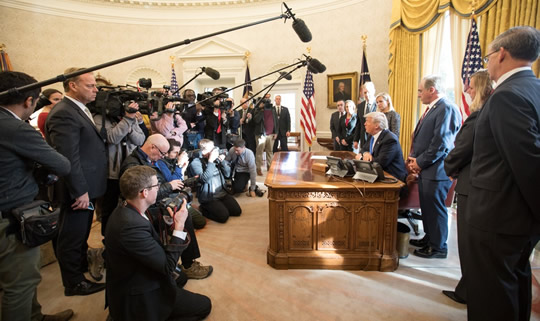By Sandra Basu
WASHINGTON—President Donald Trump has signed an executive order directing the DoD, VA and Homeland Security departments develop a plan to ensure that all new veterans receive mental healthcare for at least one year following their separation from service.
The plan that the three departments are tasked with developing must ensure that the 60% of new veterans who currently do not qualify for enrollment in healthcare, primarily due to lack of verified service connection related to the medical issue, will be able to access services for mental health care for one year following their separation from service.

President Donald J. Trump, joined by VA Se retary David Shulkin, MD, right, and Homeland Security Secretary Kirstjen Nielson, next to Shulkin, signs an executive order expanding mental healthcare services for veterans transitioning out of military service. White House photo by Shealah Craighead
Per the order, agencies have until March 9 to develop and submit the joint plan on how they will accomplish the executive order. Within 180 days they must update the Trump administration on the implementation of that plan and outline “further reforms to increase veterans’ access to mental health services.”
“The joint action plan will describe concrete actions we must take to ensure every single veteran who needs mental health and suicide prevention services will receive them immediately upon their separation from military service,” Trump said in his announcement in January.
Secretary of Veterans Affairs David Shulkin, MD, has called suicide prevention his top clinical priority. VA estimates that 20 veterans a day take their lives.
At a Senate hearing last fall on suicide prevention, University of Utah National Center for Veterans Studies Executive Director Craig Bryan pointed out that VA data shows that, from 2001 to 2014, the suicide rate among veterans who do not use VA services increased by 39% from 2001 to 2014, whereas the suicide rate among VA users increased by only 9%.
A study from the Naval Postgraduate School cited in a White House fact sheet found that veterans three to 12 months out of military service are three times more likely to commit suicide than their active duty compatriots, while those up to three months out of service were 2.5 times as likely.
At the White House signing of the new executive order on Jan. 9, Shulkin said that, while the 12-month period following service is the time when veterans are at highest risk for suicide, currently only 40% of those servicemembers have coverage in the VA to get treatment.
100% Coverage
“Now 100% will have that coverage, and it’s the full array of services that the Department of Defense and the Department of Veterans Affairs will be able to provide in terms of mental health coverage,” he pointed out.
In response to the announcement, American Psychological Association Chief Executive Officer Arthur C. Evans, PhD, said “it represents an important commitment from the administration to provide seamless access to mental health care throughout a period when many who have served in our nation’s military are at significant risk for readjustment issues, clinical levels of distress and even suicide.”
On Capitol Hill, several Republicans praised the measure.
“Ensuring servicemembers have the resources and support they need to successfully transition from active duty to civilian life is one of our highest duties,” said House Committee on Veterans’ Affairs Chairman Phil Roe, MD (R-TN).
“President Trump’s executive order prioritizes seamless access to mental health services for veterans and builds on the positive work of the Veterans’ Affairs Committee to make their transition successful,” said House Committee on Veterans’ Affairs Subcommittee on Oversight and Investigations Chairman Jack Bergman (R-MI)
Some key Democrats raised some questions, however. House Committee on Veterans’ Affairs Ranking Member Tim Walz (D-MN) said he was “seriously concerned by the White House’s failure to provide any specific details to Congress or engage with veterans’ organizations in the community until the day of the executive order.”
“The lack of transparency also raises skepticism of the White House’s claim that this executive order will not require additional funding,” Walz said, adding that the executive order “should not be seen as an opportunity for the administration to push even more critical veterans services and programs into the private sector.”
His counterpart on the Senate Committee on Veterans’ Affairs Committee, Ranking Member Jon Tester (D-MT) said he also remains “concerned about sufficient resources and staff needed to successfully execute this initiative.”
“When it comes to serving our nation’s veterans, particularly those most at risk for mental illness, there is no room for error. It is essential that the VA provides a detailed plan for this initiative,” he said.

